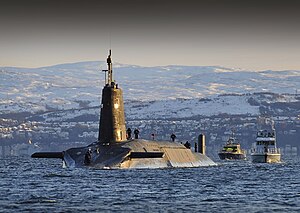Vanguard class submarines

HMS Vanguard at Faslane, 2010
|
|
| Class overview | |
|---|---|
| Builders: | Vickers Shipbuilding and Engineering, Barrow-in-Furness, England |
| Operators: |
|
| Preceded by: | Resolution class |
| Succeeded by: | Dreadnought class |
| Cost: | Over £1,500M per boat; Total programme cost £15 billion |
| In service: | 1993–present |
| Completed: | 4 |
| Active: | 4 |
| General characteristics | |
| Type: | Nuclear-powered ballistic missile submarine |
| Displacement: | Submerged: 15,900 t (15,600 long tons; 17,500 short tons) |
| Length: | 149.9 m (491 ft 10 in) |
| Beam: | 12.8 m (42 ft 0 in) |
| Draught: | 12 m (39 ft 4 in) |
| Propulsion: |
|
| Speed: | Over 25 knots (46 km/h; 29 mph), submerged |
| Range: | Unlimited |
| Complement: | 135 |
| Sensors and processing systems: |
|
| Electronic warfare & decoys: |
|
| Armament: |
|
The Vanguard class is a class of nuclear-powered ballistic missile submarines (SSBNs) in service with the Royal Navy. The class was introduced in 1994 as part of the Trident nuclear programme, and includes four boats: Vanguard, Victorious, Vigilant and Vengeance. They were built between 1986 and 1999 at Barrow-in-Furness by Vickers Shipbuilding and Engineering, which is now owned by BAE Systems. All four boats are based at HM Naval Base Clyde (HMS Neptune), 40 km (25 mi) west of Glasgow, Scotland.
Since the decommissioning of the Royal Air Force WE.177 free-fall thermonuclear weapons in 1998, the four Vanguard submarines are the sole platforms for the United Kingdom's nuclear weapons. Each submarine is armed with up to 16 UGM-133 Trident II missiles. The class is scheduled to be replaced starting 2028, though its replacement would not enter service until early 2030s.
Beginning in the late 1960s, the United Kingdom operated four Resolution-class submarines, each armed with sixteen US-built UGM-27 Polaris missiles. The Polaris missile was supplied to Britain following the terms of the 1963 Polaris Sales Agreement. This nuclear deterrent system was known as the UK Polaris programme. In the early 1980s the British government began studies examining options for replacing the Resolution-class submarines and its Polaris missiles, both of which would be approaching the end of their service lives within little over a decade. On the 24 January 1980, the House of Commons backed government policy, by 308 votes to 52, to retain an independent nuclear deterrent. Options that were examined included:
...
Wikipedia
